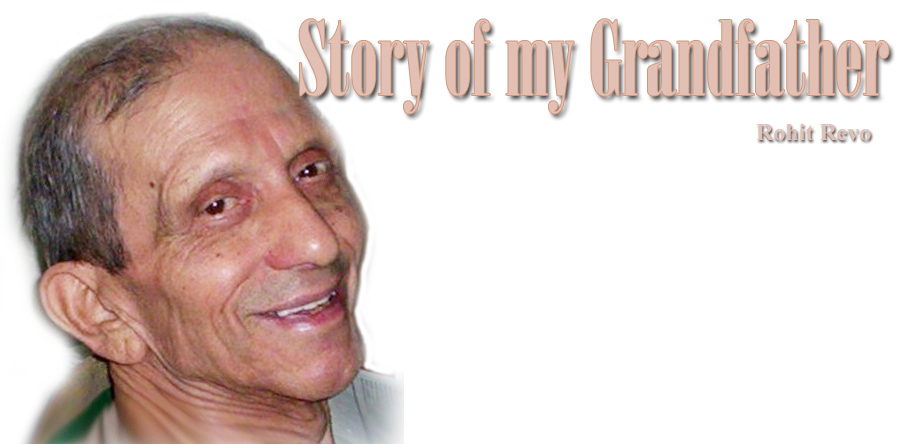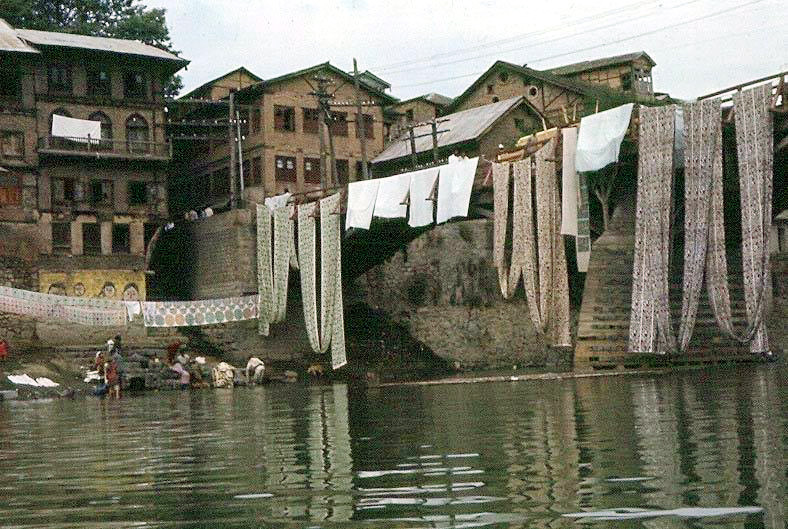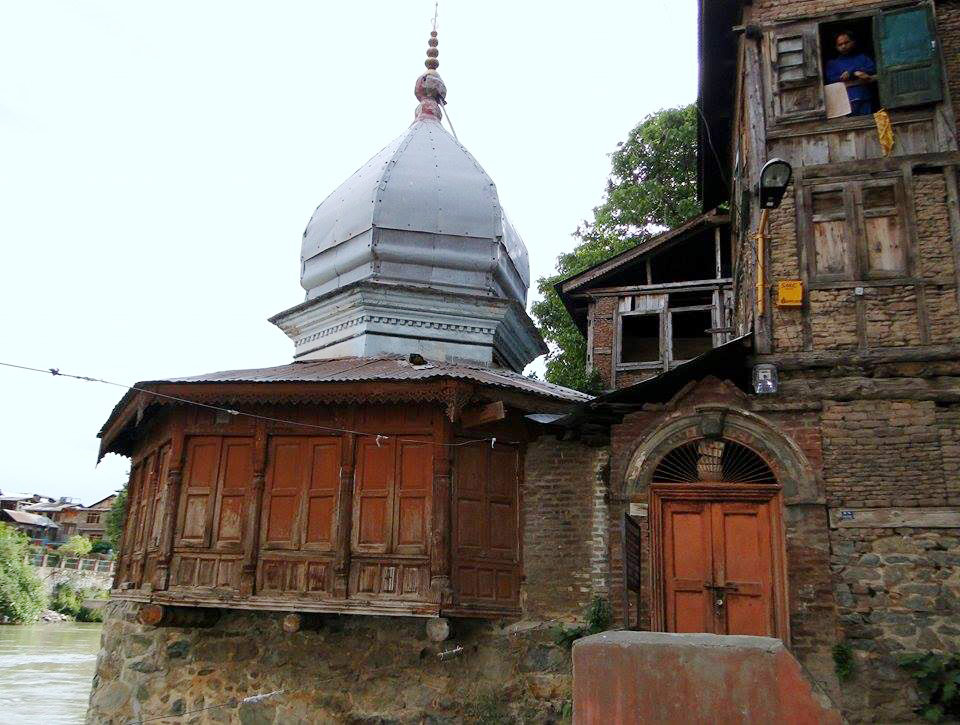Story of my Grandfather

|

|
| After a very harsh winter, and the advent of spring, the rays of sun had started to enter the kanei in the mornings. Even though the wind was a bit chilly, it was a joy for the household kids to watch the penetrating sun beams, with thick dust particles dancing within. Occasionally the elders also used to revel watching this sight with no fear or concern for any modern day diseases like dust mites and dust allergies. The concept of morning newspapers delivered home was not even a luxury, as no English newspapers were printed in Kashmir in those days and the closest print edition was the New Delhi edition which used to land in the afternoon Delhi flight and would reach the local newspaper store at the corner of Ali Kadal bridge around 4 pm. So there would be plenty of time in the mornings to discuss and adopt a very leisurely lifestyle, where often neighbours and other cousins from joint family would assemble. Suddenly the kanei with its open plan had become the home epicentre as the pot kuth was abandoned. Pot kuth used to be a gone room all encompassing area which had a functional kitchen, an old 2 seater sofa; a big kitchen bench used primarily for the water bucket, as there were no plumbing facilities in this room. Thus water had to be physically carried over from the ground floor and my grandmother would often make 2-3 trips a day to fetch the water with no complaints. With only 2 windows, including a single lattice window in the room, which used to remain closed all the time in winter, pot kuth often used to become boring after a few months.
Normally at this hour on a weekend, my grandfather Ram Chandra Revo, would have done the customary ritual of walking to Hari Parbhat and then doing a circumambulation of the Chakrishwer temple and visiting spring laden flowers in Badamveer. But today was the day when a few neighbours would come and discuss with my grandfather. His experience of working with his managers from UK in Grindlays Bank (now ANZ Bank) and repeated practice of maintaining documentation in the bank, had given him the natural gift of beautiful handwriting. Working with these people in the bank, also meant that he had access to magazines like Psychology Today, ample editions of Readers Digest, banking volumes, books, novels and many other magazines. He had a very big collection of books which always used to collect dust inside the many cupboards spread across many different rooms. This gave him a great command over the expression and writing of English language. This quality of his was quite well known in the Batyar mohalla and surrounding areas. We would often see people come to our house on Saturday mornings asking for my grandfather to fill a Darkhast, which would be a plea to government authorities to address their wrongdoings.
This morning, the visitors in the house kaeni included Rahman Dhobh, an overweight middle aged person, who also happened to be a low rung member of ruling National Conference Party and he would often project this status as if he was next to Sheikh Abdullah, the then ruling party founder and State Chief Minister. He used to wash namdas and raffal at the Batyar ghat of the Jhelum river. His trousers used to be very wide and would have fitted two Rahman's inside and in true Islamic tradition would always expose his feet and ankles. His shalwar or shirt would extend to his knees. Living in a brick house with big windows on the street, almost next to Hazrat Syed Mohammad Amin Owaisi Saheb's shrine known colloquially instead as Woosi Saeben masheed, gave him an exalted status in the community. Mohammed Amir Owasi was a Persian Sufi poet who was adopted by the wife of Kashmiri king Zain-ul-Abidin. Rahman's trade mark would be his monstrous belch which he would almost always project after lunch and dinner. This would have to be done just outside his home on the street and he made all attempts to amplify the sound of his belch which could be heard inside all homes in the locality. This customary habit had become his way of projecting his so called power in the street. There was also a local belief that belching after eating food is a sign of a happy gut.
Rahman's grouse this morning was the extreme shoddy work done by the contractors meant to repair the nael (open drains). Within just a week of completing the work, the drain had gone back to its old state with massive potholes and water logging, as if the cement had sunk in or perhaps there was hardly any cement in the mix. This had made Rahman angry along with other neighbours as this would mean they would be exposed to the bad smells emanating from the litter from the drains and would have to meander their way through this, every time they left their homes. After all, just a few months back their Darkhast for repairing the drains was approved by the government. Rahman now wanted another Darkhast to be prepared. This time he had come with few other community members including another shawl cleaner, Ghulam Hassan, shop keeper Asudullah and local ladies Noor and Aape. Local dialect and rules dictated that no one would be called using their full names. Thus Asadullah was known as Ausd and Ghulam Hassan was Hassan Dhobh. This morning at the kaeni, the scene was looking like a mini panchayat. All the group members had their strong views and would raise their voice and often blame their own bad luck rather than the shoddy work of the contractors. Each one thought they had a stronger point. Whenever Ghulam Hassan or Rahman would speak about the appalling state of affairs of the lanes, Noor and Aape would start abusing the contractors in choicest of Kashmir abuses - 'Ha payekeh trath', 'Dodkhe Khan', 'Khoda tale denakh aime kame hund saza' as if the drains were their own household property. My grandfather’s job was difficult as he had to channel all the frustration and pick up logical points for inclusion in the less than A4 size hand written note or sometimes on the now defunct Island Letter which was a blue coloured sheet which had the provision of folding and writing the address on the outside. The wailing of women and loud shouts would attract attention from the morning crowds in the neighbourhood, who were visiting the Batyar temple and also those visiting the Vusi saeb mosque and Bul bul Lankaer mosque. Scores of customers waiting for the kandur to bring out their girdas from the oven would also point their heads in the direction of our house to listen to the loud cries. The other cousin families would also assemble in the kaeni and hear out the community grievances. |
| |
 The author used to be a resident of Batyar, Alikadal and is presently settled in Sydney. He is the editor of the online portal indianherald.com.au which brings stories on India and Australia.
The author used to be a resident of Batyar, Alikadal and is presently settled in Sydney. He is the editor of the online portal indianherald.com.au which brings stories on India and Australia. |
| |


